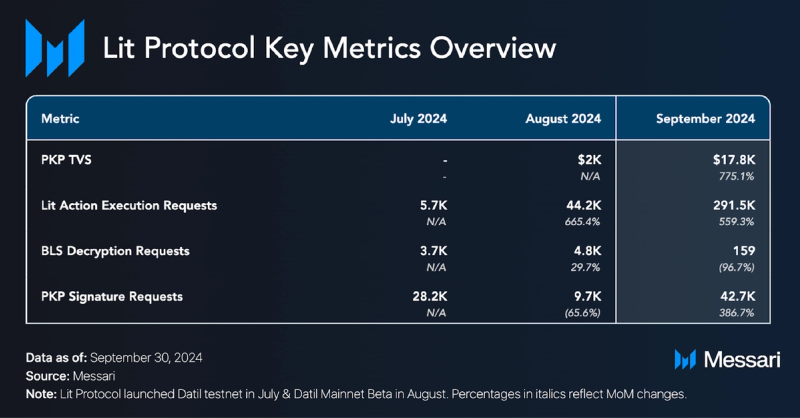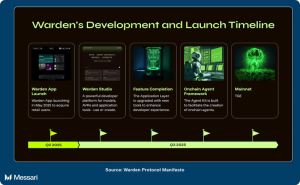Key Insights
- In Q3, Lit Protocol launched the Chronicle Yellowstone blockchain, Datil Testnets, and Datil Mainnet Beta.
- In September 2024, there were 291,500 Lit Action execution requests, a 559.3% month-over-month (MoM) increase.
- Programmable Key Pairs (PKP) signature requests increased to 47,200 in September 2024, representing 386.7% MoM growth.
- By the end of September 2024, the total value secured (TVS) in PKPs was $17,800, a 775.1% MoM increase. Ethereum led the PKP TVS distribution, contributing 27.5%, followed by Optimism with 14.1% and Base with 13.7%.
- Studio 256, GVNR, idOS, Genius Terminal, VaultLayer, and others integrated Lit Protocol’s infrastructure.
Primer
Lit Protocol is a key management and compute network that makes decentralized infrastructure and privacy tools easily accessible to developers. By leveraging advanced cryptography, sealed confidential hardware, and peer-to-peer networking, Lit enables developers to securely generate and manage non-custodial keys, implement private computations, and create adaptable access control mechanisms. Lit’s decentralized network fosters a range of applications by offering four core functionalities:
- Decentralized Access Control: Lit allows developers to encrypt data with custom access control policies, ensuring only authorized users can access private data.
- Private Compute with Lit Actions: Lit Actions are JavaScript programs that dictate how Lit keys sign or decrypt data, enabling automation. Lit Actions are executed offchain within the Trusted Execution Environment (TEE) of each Lit node and can read and write between any blockchain or offchain system.
- Wallet-as-a-Service: Lit’s key management enables wallet creation without requiring users to manage private keys, simplifying onboarding via Web2 authentication and enhancing accessibility in decentralized apps.
- Crypto Agents: Using Lit’s Multi-Party Computation Threshold Signature Schemes (MPC TSS) and Trusted Execution Environments (TEE), crypto agents can operate fully autonomously without human intervention accessing traditional web services and blockchain networks.
The Lit network consists of a collection of sealed Lit Nodes. Each node performs cryptographic operations in parallel with others, requiring two-thirds consensus to sign or decrypt, ensuring security and privacy. Lit’s distributed key generation (DKG) model ensures that no single node holds complete key access. Currently, Lit Protocol’s Datil Mainnet Beta is live on the Chronicle Yellowstone blockchain. Lit Protocol raised over $15 million in investments from 1kx, Collab+Currency, Sfermion, and more. For a complete primer on Lit Protocol, refer to our Initiation of Coverage report.
Website / X (Twitter) / Discord / Telegram
Key Metrics
Performance Analysis
Network Activity
As of December 13, 2024, Lit Protocol’s total value secured (TVS) on mainnets and testnets is ~$141,000, with ~$134,000 of that being on Datil mainnet. There are ~1 million total keys on mainnets and testnets and a total of ~275,000 PKP addresses. Lit Protocol’s live metrics dashboard can be found here.
Lit Actions
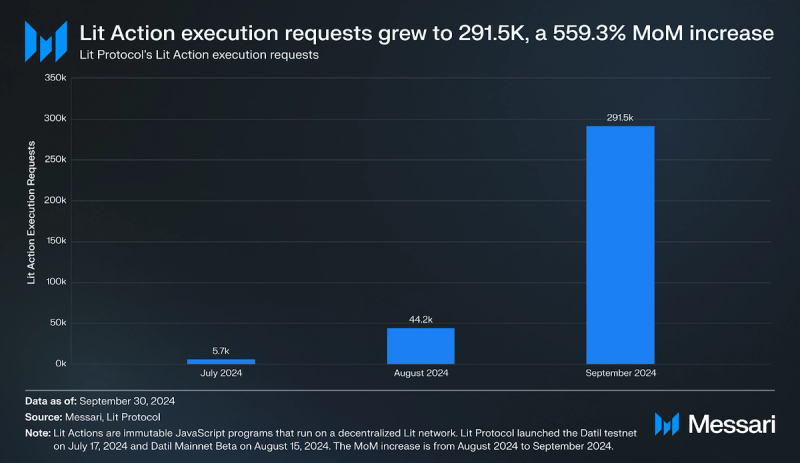
Lit Actions are immutable JavaScript programs that run on a decentralized Lit network. In September 2024, there were 291,500 Lit Action execution requests, a 559.3% month-over-month (MoM) increase from August to September.
BLS Decryptions
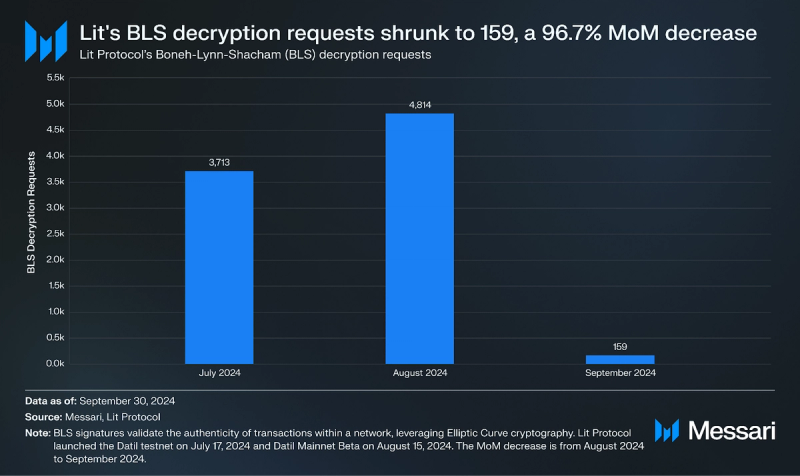
Boneh-Lynn-Shacham (BLS) signatures are cryptographic signatures that validate the authenticity of transactions within a network, leveraging Elliptic Curve cryptography. In September 2024, there were 159 BLS decryption requests, a 96.7% MoM decrease from August to September. Of note, most decryption traffic remains on Lit’s legacy centralized alpha network, Jalapeno.
PKP Signatures
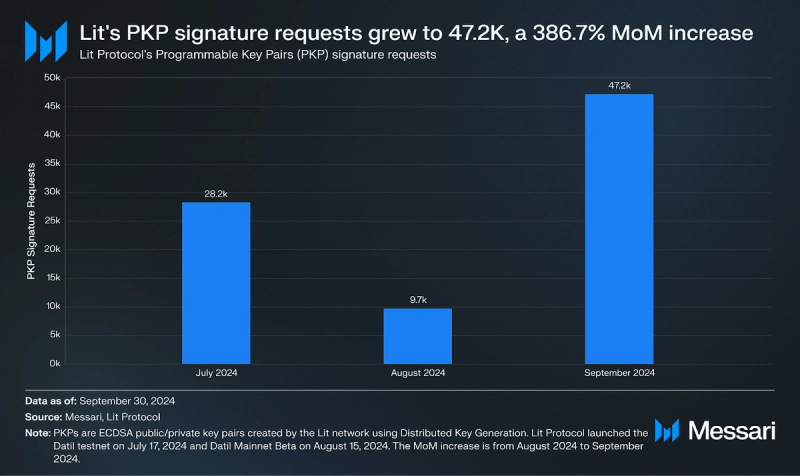
Programmable Key Pairs (PKP) are ECDSA public/private key pairs created by the Lit network using Distributed Key Generation (DKG). In September 2024, there were 47,200 PKP signature requests, a 386.7% MoM increase from August to September.
PKP Total Value Secured
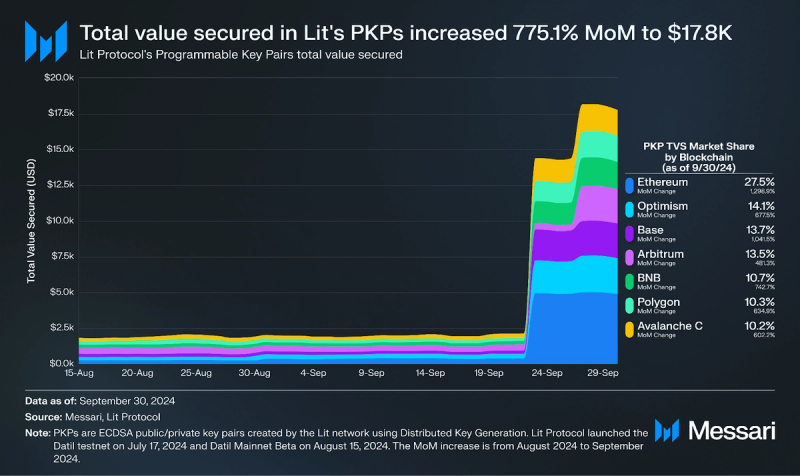
By the end of September 2024, the total value secured (TVS) in PKPs was $17,800, a 775.1% MoM increase from August to September. Ethereum led the PKP TVS distribution, contributing 27.5%, followed by:
- Optimism: 14.1%
- Base: 13.7%
- Arbitrum: 13.5%
- BNB: 10.7%
- Polygon: 10.3%
- Avalanche C: 10.2%
On September 23, 2024, the network officially launched PKP signing, enabling integration partners to begin implementation. This launch caused a significant increase in PKP TVS.
Qualitative Analysis
Upgrades and Roadmap
In Q3 2024, Lit Protocol introduced several technological advancements to enhance its decentralized key management network.
Chronicle Yellowstone
In July 2024, Lit Protocol introduced the Chronicle Yellowstone blockchain, an Arbitrum Orbit chain and replacement to its Chronicle EVM rollup chain. Chronicle Yellowstone has significantly improved transaction speed and helps users avoid previous RPC bottlenecks and outages that burdened the network.
Datil-Test and Datil-Dev Testnets
On July 17, Lit Protocol introduced the Datil-Dev and Datil-Test testnets operating on the Chronicle Yellowstone blockchain to support decentralized application development and testing. Datil-Dev, a centralized testnet, replaced the earlier Cayenne testnet, offering developers a platform for early-stage development without enforced payments. This environment allows for free testing with keys that are not persistent and will be deleted.
Concurrently, the Datil-Test network was launched as a decentralized test environment, superseding the previous Manzano testnet. As a decentralized network, Datil-Test enforces payments through Capacity Credits and, like Datil-Dev, supports testing with temporary keys that will be deleted. Datil-Test mirrors the Datil mainnet’s code and configuration, ensuring consistency between testing and production environments.
The Datil network is more stable and robust than the previous Habanero Mainnet Beta, with a roughly 2x improvement in overall performance. The following benchmarks were recorded on Lit’s internaldev network, a centralized testnet with seven nodes, which resembles the performance expected on the Datil-Dev network:
- BLS Decryption: At low load, a single decryption took around 200ms. Under max capacity, the network handled up to 600 decryptions in parallel, processing about 8 requests per second, each taking roughly 4 seconds to complete.
- ECDSA Signing: At low load, a single sign request took around 700ms. At full capacity, the network handled 70 signature requests in parallel, with approximately 3 requests per second, each taking about 8 seconds to complete.
These benchmarks were recorded on smaller 16-core CPUs, while the Datil mainnet operates on larger 64-core CPUs and is expected to show further performance improvements.
Lit V0.1: Datil Mainnet Beta
On August 15, Lit Protocol launched the Datil Mainnet Beta, superseding the Habanero Mainnet Beta. Like Datil-Test, Datil operates on the Lit blockchain, Chronicle Yellowstone, and requires payment in Capacity Credits for network usage. The Datil Mainnet Beta offers a robust platform for production deployment and introduces several enhancements, including improved transaction speeds and stability.
Lit Explorer
On August 16, Lit Protocol unveiled an overhaul to the Lit Explorer, enhancing its functionality and user experience for developers. Below are the key improvements:
- Integration with abi.ninja, which enables seamless interaction with Ethereum smart contracts
- Improved tooling to support Lit Action development, such as a Create Lit Action tab to write and deploy code
- Integration with Wagmi to add dynamic integrated wallet support
- Improved Profile tab experience for viewing and managing all PKPs
- Streamlined PKP minting and a new search functionality to locate PKPs and Lit Actions by address, token ID, public key, or IPFS CID
Other Upgrades
Besides the blockchain and network upgrades, in Q3, Lit Protocol introduced:
- A Patch to AMD SEV-SNP VM Code: This patch significantly increased transactions per second, as demonstrated in the internal benchmarks mentioned earlier.
- Sign and Decrypt in Lit Actions: This feature introduced two primitives: Decrypt within an Action and Sign within an Action. These primitives allow developers to move signing and decryption operations from the client side to directly within the Lit sealed compute environment present within each Lit Node.
- Wrapped Keys: This feature lets developers generate a new private key (or import an existing one) within a Lit node’s Trusted Execution Environment (TEE) via a Lit Action. Wrapped Keys support any blockchain or signing curve but differ in security assumptions from PKPs.
Roadmap
The Datil launch marks the final release before Lit V1, scheduled for later this year. The V1 network will introduce additional performance improvements, a new payment model, and the Lit Protocol token (LITKEY).
The V1 network will support key recovery, meaning developers will not have to perform manual migration steps. Instead, all keys generated on the Datil network will be persistent and automatically available when V1 goes live.
Lit Protocol also plans to expand the range of supported cryptographic keys:
- ECDSA Keys
- Supported Curves:
- Use Cases:
- Transport Layer Security (TLS) certificate signing
- A “Login with Google” feature can leverage LIT’s P-256 passkeys
- Schnorr/EdDSA (FROST) Signatures
- Fully Homomorphic Encryption (FHE) Keys
- Threshold Decryption: Implement joint decryption across multiple parties, reducing single points of failure
- Exportable MPC Keys: Extend the power of Multi-Party Computation (MPC) by exporting keys for further use
Ecosystem Projects
As of September 2024, at least 70 projects and potentially hundreds were built using Lit. These projects span multiple verticals, including Developer Tooling, Data Marketplaces, Identity, Digital Product NFTs, and User Wallets.
Integrations
Studio 256
On September 17, Studio 256 used Lit Protocol and Livepeer to build a decentralized, serverless streaming application that enables creators to share paid content without relying on traditional servers or centralized platforms. By leveraging Lit Actions, creators can securely manage content access through message signing and user permission checks.
GVNR
On September 18, GVNR announced a partnership with Lit Protocol to integrate its decentralized Multi-Party Computation (MPC) signing solutions, enabling permissionless and universal access control.
Genius Terminal
On October 1, Genius Terminal launched its beta, offering a decentralized, non-custodial token management platform built on Lit Protocol. By leveraging Lit’s MPC and Programmable Key Pairs (PKP) infrastructure, Genius securely shards users’ keys across nodes, ensuring only account holders can access their funds. Genius’s integration simplifies cross-chain transactions with a cloud-based wallet, using Genius Vaults on target networks for secure, bridge-free token exchanges across chains.
idOS
On October 2, idOS announced a collaboration with Lit Protocol to introduce key recoverability for its users. This integration allows idOS users to securely back up their credentials and recover their passwords if forgotten by signing a message from their connected wallets.
VaultLayer
On October 7, VaultLayer launched the beta version of its chain-abstraction SDK for Bitcoin DeFi. VaultLayer leverages Lit Protocol’s threshold key management network to create an offchain Bitcoin smart account. This approach simplifies permissions and ensures secure, seamless transactions across Bitcoin L1 and any L2.
Emblem
Emblem plans to launch its V2 in Q1 2025, leveraging Lit Protocol’s PKPs, TEE, and other infrastructure components. Emblem is also introducing EmblemAI, a cross-chain AI agent wallet platform powered by Lit.
Hackathons and Events
During Q3 2024, Lit Protocol actively participated in various hackathons and events:
ETHOnline
ETHGlobal hosted ETHOnline, an asynchronous hackathon from August 23 to September 13. Lit Protocol offered $7,000 in prizes to projects that built the best Compute Over Private Data Protocol and Signing Automation Protocol on Lit. Notable projects include InsuranceRiskModel, HyperHarvest, LitAuction, FHE Oracle, Lit Alpha Box, and Firmar.
Other Events
The Lit Protocol team attended and spoke at the Ethereum Community Conference, FIL Dev Summit, Chain Abstraction Day, Science of Blockchain Conference, and Messari’s Mainnet.
Closing Summary
Over the past quarter, Lit Protocol upgraded its network and expanded its ecosystem. Launching the Chronicle Yellowstone blockchain, an Arbitrum Orbit chain, improved transaction speeds and resolved bottlenecks, while introducing the Datil Testnets and Datil Mainnet Beta enhanced development platforms. In September 2024, there were 291,500 Lit Action execution requests, 159 BLS decryption requests, and 47,200 PKP signature requests. Enhancements to Lit Explorer improved the developer experience, and integrations with projects like Studio 256, GVNR, idOS, Genius Terminal, and VaultLayer expanded the ecosystem across multiple verticals. Upgrades like the AMD SEV-SNP VM code patch further boosted network performance. Participation in events like ETHGlobal’s ETHOnline 2024 fostered community engagement and developer involvement. Looking ahead, the upcoming Lit V1 network will introduce additional performance improvements, a new payment model, the Lit Protocol token (LITKEY), and an expanded range of supported cryptographic keys on the Datil network.

